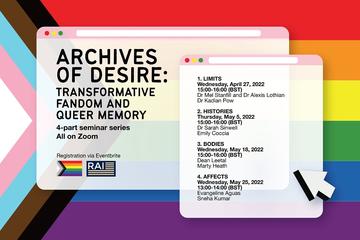Archives of Desire: Transformative Fandom and Queer Memory – 2. Histories
Dr Sarah Sinwell
Emily Coccia

Archives of Desire: Transformative Fandom and Queer Memory
4-part seminar series, All on Zoom
Registration via Eventbrite
This free seminar series is premised on the idea that online fan spaces archive queer desires.
Transformative fandom (where fans adapt pre-existing, copyrighted media properties to create their own artworks, stories and videos) has been theorised as:
a) innately memorialising – recording how individual fans feel about the media they consume, and
b) structurally queer – troubling gender and sexuality norms.
This series asks what happens when we view fan works, and the digital spaces in which they circulate, as records of contemporary LGBTQIA+ cultural memory.
- Who is included or excluded in this type of memorialising?
- How does race, gender identity and privilege shape fan archives and the histories they document?
- What kinds of feelings do these repositories preserve, generate or share?
- How do they relate to other forms of queer remembering?
Join our incredible line-up of fan scholars this Trinity term, as we explore these ‘Archives of Desire’! All events free to attend and open to the public.
Seminar 2. HISTORIES
Dr Sarah Sinwell
Glance Choreography and Grazing Fingers: Excavating Fandom of Queer Female Historical Period Dramas
In 2021, Saturday Night Live (NBC, 1975-present) featured a short about lesbian period dramas such as Ammonite (Francis Lee, 2020) and Portrait of a Lady on Fire (Celine Sciamma, 2019). Focusing on the use of “glance choreography,” “the wind,” and “grazing fingers,” the short also draws attention to the tendency of these period films to feature white straight actresses in queer roles and direction by men. At the same time, it also points to the ways in which queer female fandoms are invited to search for themselves within historical period dramas. Excavating the ways in which film and television series such as Ammonite, Portrait of a Lady on Fire, Anne with an E (CBC/Netflix, 2017-2019) and Dickinson (Apple TV+, 2019-present) explore representations of bisexual, queer, and other LGBTQIA+ female identities, this paper looks at what happens when fans and audiences are invited to (re)imagine historical understandings of both femininity and queerness. Drawing attention to the absence of LGBTQIA+ characters within media histories more generally, this paper also argues that these representations are still limited to cis-, femme, and white readings of queer femininity and female intimacy that both limit and open up possibilities for more inclusive queer female histories.
Bio
Sarah E. S. Sinwell is an Associate Professor in the Department of Film and Media Arts at the University of Utah. She has published essays on Green Porno, BoJack Horseman, and Mysterious Skin in Women’s Studies Quarterly, Jump Cut, and Asexualities: Feminist and Queer Perspectives. Examining shifting modes of independent film distribution and exhibition on YouTube, Hulu, Netflix, and SundanceTV, her book Indie Cinema Online (Rutgers University Press, 2020) redefines independent cinema in an era of media convergence. Sarah teaches both undergraduate and graduate courses, including Diversity in Film and Media, Women Directors, Queer Media, Independent Cinema, and Convergence Cultures.
Emily Coccia
Unruly Archives and Too-Close Readers
This talk offers a fan-inspired scholarly methodology I term “too close reading” as a mode of approaching unruly popular culture archives that have rarely been afforded the same granular attention that wealthy, white recorded histories and literature have in narrating queer history. Despite the ways that fandom all too frequently privileges white, cis characters, relationships, and histories in creating content, I argue that fans’ methods of excavating queerness provide a useful model of reading. I offer this framework both as a methodology for recognizing forms of queerness less readily identifiable through the lens of middle-class scholarly frameworks and as a way of conceptualizing how nineteenth-century women may themselves have interacted in queer, fannish ways with cheap, sensation fiction that has, like fanfic, been dismissed as unworthy of close literary attention.
To read fannishly is to be deeply invested in all that is on the page and particularly attuned to minute details and hints of queer possibilities that become clearer the closer one gets to the text and the larger “universe” in which it is situated. Too close readers spin narratives of possibility from parentheticals, marginalia, and trace evidence. They venture into the speculative territory of what might be true, finding the conditional to be just as fruitful as the indicative, the fleeting just as meaningful as the established.
Like contemporary fans, nineteenth-century readers, particularly working-class and female consumers, have long been critiqued for their immersive readerly practices, for the way they are swept up in texts, “perverting” their understanding of reality. Yet this too-closeness may have offered a mode of queer textual subject-formation in which they, like the characters on the stories’ pages, “contracted” the habits of their “eccentric little friend[s]” (Southworth 326). And for scholars, such granular attention to texts rarely deemed worthy of it might allow us to better recognize and draw out traces of queer lives that fall aslant wealthy, white histories.
Bio
Emily Coccia is a PhD candidate in the University of Michigan’s English and Women’s and Gender Studies Program. Her research has appeared in Legacy and Transformative Works and Cultures, and she has spoken on fan podcasts about shows including Gentleman Jack and Supergirl. Her dissertation aims to recover a more robust history of workingwomen, their communities, and their desires in nineteenth-century American history through a "too close reading" of labor periodicals, story papers, dime novels, and other genres of working-class literature.



